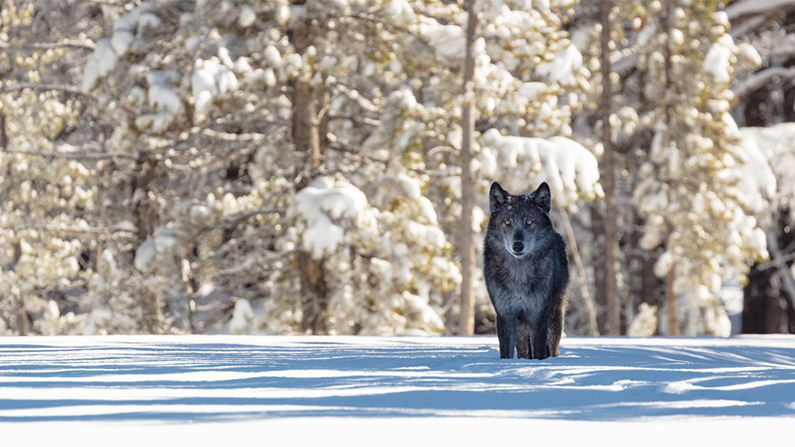Yellowstone National Park has been the site of one of the most detailed studies of a large carnivore in the world since wolves were reintroduced there in 1995. That research was put at risk this winter after Montana and Idaho loosened hunting regulations for the animals, resulting in the killings of at least 25 wolves just outside of the park boundaries, where there used to be a buffer zone.
KHOL’s Kyle Mackie spoke to reporter Mike Koshmrl to learn more. His recent story for the nonprofit publication WyoFile is called, “Yellowstone: Wolf hunt altered behavior, damaged research.”
KYLE MACKIE/KHOL: Mike, thank you so much for joining us today on KHOL.
MIKE KOSHMRL: Hey Kyle, I’m happy to join you, too.
KHOL: In your story, there are some pretty profound impacts that have been observed by biologists on how these killings have affected packs. What are some of those impacts that you found out about?
KOSHMRL: So, the primary National Park Service person I interviewed for this story—Doug Smith, he’s the senior wildlife biologist there [at Yellowstone National Park]—he kind of walked me through what happened with some of the packs. The most direct effect is a pack was eliminated, essentially. Not necessarily that all of its members were shot and killed, but enough of them were shot and killed where the rest of the pack just kind of like dissolved and the wolves dispersed across the landscape.
That pack is called the Phantom Lake Pack, and they blocked this other pack called the Junction Butte Pack, that is probably the most visible pack in Yellowstone, from leaving the park. So, once their territory was vacated, then all of a sudden, the Junction pack had kind of like a runway to get out of the park. And then that pack was the most heavily hit. I think eight of its members were killed by hunters and trappers outside the park in Montana, legally. But a big distinction that Doug Smith pointed out to me is that soon Yellowstone will release like a wolf monitoring report—they put it out every year—and the numbers might look very similar to last year. You know, [a count of] 100, low 100-something wolves that dwell in the park. And the reason for that, or one potential reason for that, is because this hunting has stimulated reproduction.
And so, it’s kind of like a compensatory reaction that is just part of wolf biology, where if you kill a bunch, they respond by breeding more. So, I heard that there had been two packs where they actually saw four females, different females breeding. So, you could see a number of litters in a couple packs on the northern range, where the hunting pressure was the highest, end up producing litters and basically the population will rebound. It might even exceed where it was last year, despite [a] record-high number of park wolves being killed.
KHOL: Yeah, that was one of the most interesting parts of your story to me. And you can almost hear the counterargument of, ‘Maybe are these killings potentially a good thing if they’re sparking more wolves to reproduce?’
KOSHMRL: So, the park service’s reaction to that is they’re just concerned that the public will see that and just think, ‘Well, what’s the big deal?’ But a distinction that they pointed out, or Doug Smith pointed out to me, is that their whole intent trickles down from the Organic Act, the legislation that created the National Park Service. [Its goal] is to have natural processes rule the day. And so, the idea that you have humans stimulating reproduction and wolf numbers rebound, that doesn’t square with the mission of the park service. So, even though numerically it might look fine, in their point of view they’re not doing their job if that’s the outcome.
KHOL: Before I let you go, I just wanted to ask you kind of a more philosophical question about wolves. We were able to interview an author a few years ago at KHOL—her name’s Philippa Forrester, and she wrote a book called, “On the Trail of Wolves.” And she wrote about how wolves have become like this bellwether political issue. I wonder why you think that is, that wolves have become just so polarized?
KOSHMRL: I grew up in Minnesota, where we always had wolves, and wolves were never eradicated. And it’s certainly still a divisive species. But here, there was a decades-long fight to bring back a species that people’s grandfather eradicated. And, you know, there’s a lot of anti-federal government sentiment in the West. And so, here’s the federal government, like, shoving a controversial large carnivore down the throats of people who didn’t want them. So, it almost makes sense to me that there are very strong attitudes against wolves.
And then on the other side of that, people love wolves. You know, they’re a social animal. They’re beautiful. Some Yellowstone wolves, when they’re killed it incites outrage around the world. Google ‘Yellowstone wolves’ and you’ll see there’s a lot of books that have been written over the years. There’s a lot of people that have made wolf watching a huge part of their life. So, yeah, you just have two kind of diametrically opposed camps, and maybe in many decades that will fade. But in the meantime, wolf management is a hot issue.
KHOL: Well, I’m sure we’ll talk to you again about it soon on KHOL. Thank you again, Mike, for taking the time to chat with us today.
KOSHMRL: Of course. Thanks, Kyle.






